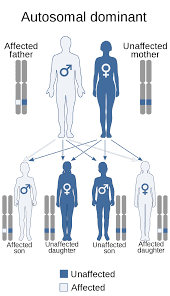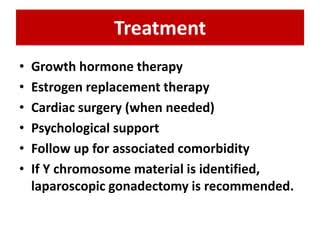Turner Syndrome: A Comprehensive Medical Overview
Introduction :
Turner Syndrome is a chromosomal disorder that affects females, characterized by the partial or complete absence of the second sex chromosome. This condition has significant medical implications, impacting growth, fertility, and overall health. In this blog, we will delve into the medical aspects of Turner Syndrome, exploring its etiology, clinical manifestations, diagnosis, and management. By understanding this condition from a medical professional perspective, we can enhance our ability to provide comprehensive care for individuals with Turner Syndrome.
Etiology:
Turner Syndrome occurs due to the complete or partial absence of one of the X chromosomes in females. The most common karyotype observed in Turner Syndrome is 45,X, where one of the X chromosomes is missing. Other variations, such as mosaicism or structural abnormalities of the X chromosome, may also be present in some cases. The exact cause of Turner Syndrome is not fully understood, and it usually occurs randomly during the formation of the reproductive cells or early embryonic development.
Clinical Manifestations:
The clinical features of Turner Syndrome can be diverse and vary among affected individuals. Short stature is a characteristic trait, with girls often being significantly shorter than their peers. Other physical manifestations include a webbed neck, low-set ears, a broad chest with widely spaced nipples, and a higher risk of lymphedema (accumulation of fluid) in the hands and feet. Some individuals with Turner Syndrome may also exhibit specific facial features, such as a flattened nasal bridge and a receding jaw.
Gonadal Dysfunction and Fertility
Turner Syndrome is associated with ovarian dysfunction, resulting in the absence or impaired development of the ovaries. As a result, affected individuals typically have low levels of estrogen and do not undergo normal pubertal development without hormone replacement therapy. They experience primary amenorrhea (lack of menstruation) and are usually infertile. However, with advancements in assisted reproductive technologies, some individuals with Turner Syndrome may have the possibility of conceiving with the help of donor eggs.
Cardiovascular and Renal Abnormalities
Cardiovascular anomalies are prevalent in Turner Syndrome, with coarctation of the aorta (narrowing of the aortic arch) being the most common. Other cardiovascular abnormalities may include bicuspid aortic valve, aortic dilation, and hypertension. Regular cardiac assessments are crucial for early detection and management of these conditions to prevent complications. Additionally, renal abnormalities, such as horseshoe kidney or renal malformations, may be present in some individuals with Turner Syndrome and require monitoring.
Endocrine and Metabolic Issues
Turner Syndrome can impact the endocrine system, leading to hormonal imbalances and metabolic issues. Hypothyroidism is more common in individuals with Turner Syndrome, requiring regular monitoring of thyroid function and appropriate hormone replacement therapy. Furthermore, impaired glucose metabolism, insulin resistance, and an increased risk of developing type 2 diabetes have been observed in this population. Maintaining a healthy lifestyle, including regular exercise and a balanced diet, is essential in managing these metabolic challenges.
Bone Health and Growth Hormone Deficiency
Individuals with Turner Syndrome often have reduced bone mineral density, increasing their susceptibility to osteoporosis and fractures. Estrogen replacement therapy is crucial for optimizing bone health. Additionally, growth hormone deficiency is frequently observed in Turner Syndrome, contributing to the characteristic short stature. Growth hormone therapy has shown significant benefits in promoting linear growth and improving adult height.
Diagnosis:
The diagnosis of Turner Syndrome is typically made based on clinical findings and confirmed through genetic testing, such as karyotyping or fluorescent in situ hybridization (FISH). Prenatal diagnosis through chorionic villus sampling or amniocentesis can also be performed in some cases. Early diagnosis is vital in initiating appropriate medical interventions and support.
Management and Support:
The management of Turner Syndrome requires a multidisciplinary approach involving various healthcare professionals. Specialists in pediatric endocrinology, cardiology, genetics, and psychology collaborate to provide comprehensive care. Hormone replacement therapy, including estrogen and progesterone, is essential for inducing pubertal development, maintaining secondary sexual characteristics, and supporting bone health.
Regular cardiac evaluations, including echocardiograms, are necessary to monitor cardiovascular health. Growth hormone therapy is initiated if growth hormone deficiency is present, with the aim of optimizing height potential. Psychosocial support, educational interventions, and counseling services also play a crucial role in addressing the emotional and social aspects of living with Turner Syndrome.
Conclusion:
Turner Syndrome is a complex genetic disorder that affects females and involves a wide range of medical considerations. By understanding the etiology, clinical manifestations, diagnosis, and management of this condition from a medical professional perspective, we can enhance our ability to provide comprehensive care to individuals with Turner Syndrome. Collaboration among healthcare professionals is crucial in addressing the specific challenges associated with Turner Syndrome, optimizing health outcomes, and promoting the well-being of affected individuals









Comments
Post a Comment